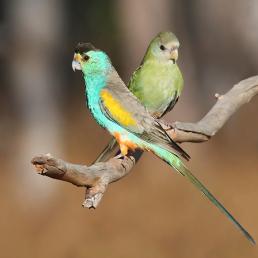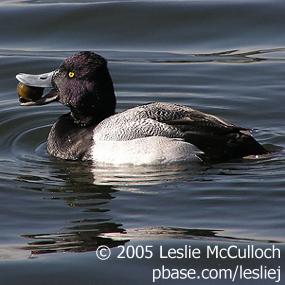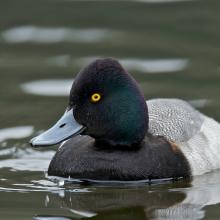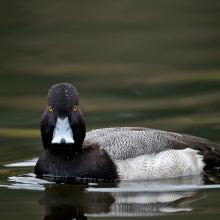

Join BirdNote tomorrow, November 30th!
Illustrator David Sibley and actor H. Jon Benjamin will face off in the bird illustration battle of the century during BirdNote's Year-end Celebration and Auction!
Twenty-five years ago, there were twice as many scaup in North America as there are today. Starting in 1986, non-native zebra mussels spread rapidly throughout the Great Lakes. And scaup love to eat them. However, zebra mussels and other shellfish accumulate contaminants, including selenium, from refineries and farm fields. And selenium is toxic to wildlife in any more than minute concentrations. Scaups (like this Lesser Scaup) that have high levels of selenium may not be able to reproduce. Learn more about scaup and more about invasive species.
BirdNote®
Scaup Disappear - Unintended Consequences
Written by Todd Peterson
This is BirdNote.
[Call notes of Greater Scaup]
We transform the world often without intention. Consider scaups, fast-flying, blue-billed diving ducks that winter along both the Atlantic and the Pacific Coasts. Twenty-five years ago, there were twice as many scaups in North America as there are today. Why?
[Call notes of Greater Scaup]
We’re not sure, but here’s one possible answer. In the early 1980s, zebra mussels were introduced into North America from the bilge water of ocean-going ships. The mussels spread like wildfire. And scaups love to eat zebra mussels.
International shipping makes our coastal waters vulnerable to infestation by other exotic marine species, like the clams from Northern Japan that have established themselves in the San Francisco Bay.
[harbor sounds]
The problem is that mollusks like zebra mussels and Asian clams may accumulate contaminants, including selenium, from our refineries and farm fields. A naturally occurring element, selenium is toxic to wildlife in any more than minute concentrations. Researchers studying scaups have found that high percentages of these ducks have levels of selenium great enough to impair the birds’ ability to reproduce.
[Call notes of Greater Scaup]
No one wishes the birds harm. But the unintended consequences of our activities ripple through the natural world.
To learn more about the effect of introduced exotic species on birds, come to our website, BirdNote.org.
###
Call of the Greater Scaup provided by The Macaulay Library of Natural Sounds at the Cornell Lab of Ornithology, Ithaca, New York. Recorded by W.W.H. Gunn. Ambient Glaucous-winged Gulls recorded by A.A. Allen.
Ambient harbor sounds provided by Kessler Productions
Producer: John Kessler
Executive Producer: Chris Peterson
© 2010 Tune In to Nature.org November 2010
ID#110705GRSCKPLU decline-01b-2009-11-18-MM





